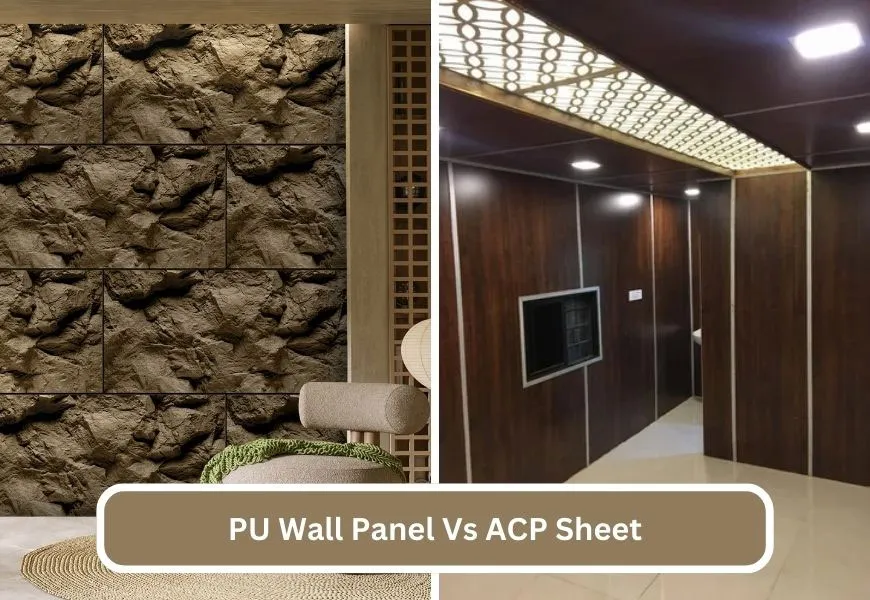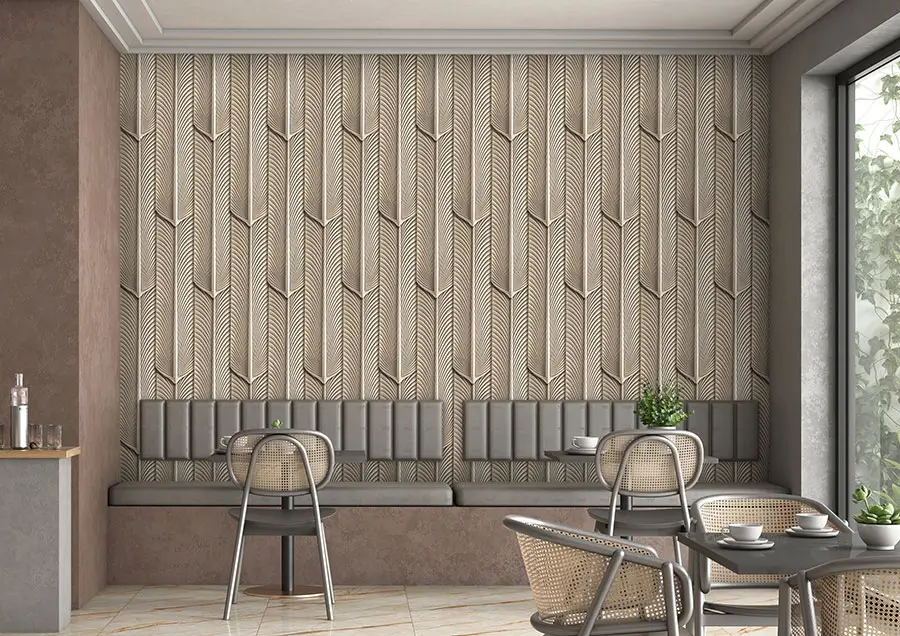
The wall panel industry is continuously evolving and transforming modern-day spaces in both residential and commercial projects. Whether you are building a project from scratch and adding a personalized touch by renovation, PU wall panels and ACP sheets provide excellent options to satisfy your aesthetic needs.
But, choosing one between the two can be a difficult task. Both these options serve vast diversity in design options and unbeatable durability. Let's compare and find the right choice for you.
Know the Difference Between PU Wall Panels and ACP Sheets
1. Aesthetic Appeal
PU wall panels : PU panels' textured and 3d appearance infuses bespoke luxury and appeal in different spaces. Their unique appearance can stimulate the natural look of feathers, wood, and stone to create a warm ambience. Therefore, pu wall panels are preferred for establishing engaging and visually striking decor.
ACP Sheets : ACPs serve the textured and sleek appearance like PU panels but lack the contemporary 3D appearance. Their wide range of collections provides bold metallic finishes, a glazed appearance, and vibrant colour schemes. Therefore, ACPs are a perfect choice for facade cladding in high-rise buildings and minimalist decor in residential apartments.
2. Structural Strength & Durability
PU wall panels : Due to their innovative manufacturing, PU wall panels offer remarkable structural strength and durability. The rigid polyurethane foam provides unbeatable protection from impact and stress. The protective film protects the wall from moisture and serves hassle-free cleaning and maintenance options.
ACP Sheets : ACP sheets being lightweight and highly durable serve as an excellent structural material for skyscrapers to residential projects. However, continuous exposure to wear and tear can impact their durability and panel strength. In comparison to PU panels, ACP sheets are more prone to succumbing to dents and scratches.
3. Moisture Resistance
PU wall panels : The protective film-coated impervious surface makes PU wall panels an excellent moisture-repellent option for architects and homeowners. The forfeited charcoal layer helps to create a barrier against moisture and establish sustainable decor in water-prone areas. Moreover, the moisture-resistant properties of PU panels also create a hygienic and safe environment for all.
ACP Sheets : Aluminum Composite Panels (ACP) offer moderate moisture resistance, primarily due to the aluminium layers on the surface of the panel. While the aluminium provides a barrier against moisture, the core material—usually made of polyethene or other plastics—can be susceptible to water infiltration if the edges or joints are not properly sealed.
Therefore, ACP panels are less effective in preventing moisture penetration compared to PU wall panels. While they are suitable for many applications, they may not be the best choice for areas where moisture resistance is a critical factor.
4. Fire Resistance
PU wall panels : PU wall panels have good fire resistance due to their composition. They can withstand high temperatures without igniting quickly. However, they may produce toxic fumes when exposed to fire. This makes them suitable for many applications, but caution is needed in areas with strict fire safety regulations.
ACP Sheets : ACP panels offer moderate fire resistance. The aluminium layers can help prevent the spread of flames. However, the plastic core can melt and contribute to fire spread if not specially treated. Fire-resistant ACP variants are available for enhanced safety. These panels are often used where fire regulations are stringent.
5. Installation
PU wall panels : PU panels are lightweight and easy to install. They can be cut to size with standard tools and attached to walls using adhesives or fasteners. The panels typically come with interlocking edges, ensuring a seamless and quick installation process. Because of their lightweight nature, they can be installed without the need for heavy support.
ACP Sheets : ACP panels are also relatively easy to install but require precise handling to avoid damaging the aluminium surface. They can be cut, routed, and bent to fit various architectural designs. Installation typically involves using a framework or support structure to secure the panels in place. Proper sealing of edges and joints is crucial to ensure durability and performance.
6. Maintenance
PU wall panels : Maintenance of PU panels is straightforward. They are durable and resistant to stains, so regular cleaning with mild soap and water is usually sufficient. Their moisture-resistant properties also prevent mould and mildew growth, reducing the need for frequent maintenance. Any minor damages can be easily repaired with appropriate fillers or sealants.
ACP Sheets : Maintenance of ACP panels involves regular cleaning to maintain their appearance. They are generally resistant to stains and can be cleaned with mild detergents and water. However, the aluminium surface can be scratched, so abrasive cleaners should be avoided. Periodic inspection and sealing of joints and edges help maintain their integrity and prevent water infiltration.
7. Environmental Impact
PU wall panels : PU wall panels have a mixed environmental impact. On one hand, they offer good insulation properties, which can lead to energy savings and reduced greenhouse gas emissions over the lifetime of a building. However, the production of polyurethane involves the use of chemicals that can be harmful to the environment.
ACP Sheets : ACP panels also have a notable environmental impact. The production of aluminium is energy-intensive and can result in significant carbon emissions. However, aluminium is highly recyclable so requires much less energy to produce. This recyclability can reduce the overall environmental footprint if the panels are properly recycled at the end of their life.
Conclusion
In summary, both PU panels and ACP sheets provide extensive benefits in several aspects. However, for making the right choice you have to align the advantages and disadvantages of both the wall panels according to your specific needs.
But one thing you should keep in mind, the durability of ACP Sheets and their aluminium composition makes them suitable for both interior and exterior use. In contrast, PU Wall Panels are primarily designed for interior.
You May Also Like :


